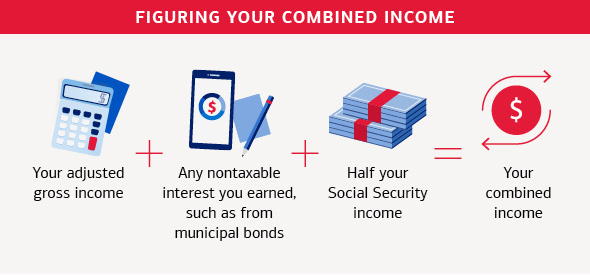For many people, the answer is yes. Consider these strategies that could help minimize the hit on this retirement income source.
Social Security was never meant to be the sole source of income for retirees. Even so, with a maximum annual benefit of $48,216 in 2025 if you file at full retirement age,Footnote 1 it can provide a significant, dependable boost. However, depending on your situation, you could owe income taxes on as much as 85% of your Social Security income.Footnote 2 Here's how that works — and what you can do to try to minimize the tax you pay.
What goes into determining your Social Security benefit?
Your Social Security benefits are largely based on your earnings history — the more you've contributed to the system via payroll taxes over your lifetime, the more you receive, up to the maximum benefit. For a 65-year-old with average lifetime earnings who retired in 2024, Social Security replaces around 39% of those past earnings; high earners can expect Social Security to replace just 25% to 30% of their preretirement income.Footnote 3
And that's
before you pay any federal income taxes on your benefits — something an estimated half of Social Security recipients
do.Footnote 4 Still, people aren't always aware of this critical piece of their retirement picture. "It can be a real shock when people begin collecting benefits," says Ben Storey, director, Retirement Research & Insights, Bank of America. But, he adds, a little upfront planning may help you avoid any shocks when calculating your taxes while also
maximizing your Social Security benefits over the long haul.
How much of your benefit may be taxed?
The amount you pay in federal income tax on your Social Security benefits is based on your "combined income," as the Social Security Administration terms it. Here's the formula for calculating that:
 Figuring your combined income. Your adjusted gross income plus any nontaxable income you earned, such as from municipal bonds plus half your social security income 'equals' your combined income.
Figuring your combined income. Your adjusted gross income plus any nontaxable income you earned, such as from municipal bonds plus half your social security income 'equals' your combined income.If you and your spouse file a joint tax return, both of your earnings will be included in your combined income to determine whether — or how much — your benefits will be taxed.
The threshold at which benefits become taxable varies, based on your combined income and filing status. (See "Calculating your Social Security federal income tax" below.) These thresholds are fixed — but because Social Security benefits typically increase each year to account for inflation, you may see your benefits taxed over time. The amount of federal income taxes you actually owe, if any, will depend on your income level, available deductions and exemptions, and other factors. State taxes may also apply to your Social Security benefits — consult your tax advisor.
Calculating your Social Security
federal income tax
| Married filing jointly |
Your combined
annual income |
How much of your Social
Security benefit is taxable |
| $32,000 or less |
None |
| Between $32,000 and $44,000 |
Up to 50% |
| More than $44,000 |
Up to 85% |
| Individual |
Your combined
annual income |
How much of your Social
Security benefit is taxable |
| $25,000 or less |
None |
| Between $25,000 and $34,000 |
Up to 50% |
| More than $34,000 |
Up to 85% |
4
ways to minimize your
Social Security tax bite

As part of an overall retirement income strategy, tax planning experts suggest a few ways that could potentially minimize taxes on your Social Security payments:
1. Time your retirement account withdrawals
You may want to consider a longer-term strategy for
drawing from your individual retirement accounts (IRAs). That's because distributions from a traditional IRA are generally included in your federal taxable income, which is the income used to calculate the income taxes you owe. Qualified distributions from a Roth IRA, however, are generally not. So, if you have both, you may want to put some thought into when you make withdrawals from one account or the other.
Tip: Roth IRA distributions are not counted as income and won't increase taxes on your Social Security benefits.
2. Consider non-retirement assets
Your non-IRA investments can also affect how your Social Security income is taxed. One strategy that might be worth considering is to purchase a tax-deferred investment, such as a deferred annuity, and structure it to begin paying income in years to come when you expect your federal taxable income — as well as your overall tax rate — to decline. A financial advisor and a tax professional could help you come up with a solution that works for your situation.
Caution: Deferring income to reduce this year's tax bill may push you into a higher tax bracket in subsequent years.
3. Try to avoid income spikes
"When you plan for retirement, you need to think in terms of multiyear projections," says Vinay Navani, a shareholder with WilkinGuttenplan, an accounting and consulting firm in East Brunswick, New Jersey. "For example, if you anticipate a one-time bump in income, such as from the sale of a business, you may be better off structuring it as an installment sale to be paid off over several years instead of as a lump sum." This can help you distribute your overall income more evenly and possibly keep you in a lower tax bracket. That in turn could help reduce the portion of your Social Security benefits subject to federal income tax. Similarly, if you inherit an IRA, consider spreading those required withdrawals out evenly (typically within 10 years) instead of making a single lump-sum withdrawal.
Caution: An unexpected financial windfall could put you in a higher tax bracket, resulting in a bigger tax bill.
4. Determine when working in retirement makes sense
If you're planning to
work in retirement, keep in mind that those earnings may raise your income enough to trigger higher taxes on your Social Security. And if you're thinking about claiming benefits early, you need to be especially careful about taking a job. When you start collecting benefits before full retirement age, Social Security
Go to third-party website limits how much you can earn popup before your benefits are reduced.
For every $2 you earn over the limit, your Social Security benefits are reduced by $1. Starting in the year you reach full retirement age, the earned income cap goes up, and for every $3 you exceed the limit, your benefits are reduced by $1. On the month you reach full retirement age, the earnings cap disappears. As the graphic below shows, even a part-time job can have an impact if you're collecting benefits before reaching full retirement age.
How working may affect your benefits
Joan retired at age 64 but has continued to work part time. Here's how her earnings from her part-time job might affect her Social Security benefit until she reaches her full retirement age.
Joan's Social Security benefit
if she earns $20,000,
which is less than the $23,400
earnings limit for 2025
Joan's full annual
Social Security
benefit
Joan's Social Security benefit
if she earns $35,000,
which is $11,600 over
the earnings limit
Amount
deducted
$5,800
$24,200
Joan's reduced
Social Security
benefit
There is some good news: When you reach full retirement age, Social Security recalculates your benefit, making up for any months when benefits were reduced due to the earnings limit.Footnote 5 And because the reduced benefit is determined by your individual earned income, if you retire early but your spouse doesn't, your spouse's earned income won't count toward the earnings cap.
Footnote 1 Social Security Administration, "What is the maximum Social Security retirement benefit payable?" October 2, 2025.
Footnote 2 Social Security Administration, "Must I Pay Taxes on Social Security Benefits?" June 30, 2025.
Footnote 3 Center on Budget and Policy Priorities, "Policy Basics: Top Ten Facts about Social Security," May 31, 2024.
Footnote 4 Congressional Budget Office, "CBO's 2024 Long-Term Projections for Social Security," August 2024.
Footnote 5 Social Security Administration, "Receiving Benefits While Working," accessed September 15, 2025.
As a CPA and shareholder at WilkinGuttenplan, Vinay Navani is not affiliated with Merrill or any of its affiliates. This article is for information and educational purposes only. Opinions and views expressed are his, do not necessarily reflect those of Merrill or any of its affiliates and are subject to change without notice.
MAP8613077-05262027